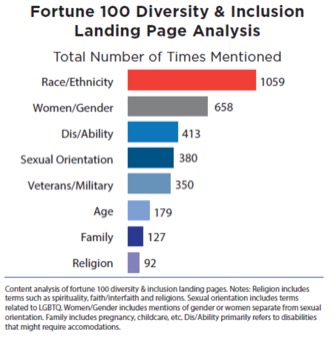Index finds corporations continue to overlook religious inclusion, with more than half of the Fortune 100 making no public mention of faith as part of diversity initiatives
ANNAPOLIS, Md. — A new annual ranking of Fortune 100 companies shows many fail to include faith and religion as part of corporate diversity initiatives. The Religious Freedom & Business Foundation’s new Corporate Religious Equity, Diversity and Inclusion (REDI) Index, released today, gives high marks to major companies like Google/Alphabet, Intel, Target, American Airlines, and Tyson Foods for taking steps to recognize the importance of faith in the lives of employees.
The REDI Index establishes a new benchmark for annual assessment of the state of corporate America’s inclusion of religion as an integral part of its diversity initiatives. Despite a positive faith-friendly trend emerging in a number of major corporations, the REDI Index also exposes striking shortfalls among Fortune 100 companies. Most companies on the list continue to overlook religious inclusion in favor of prioritizing other important diversity classifications such as race, sexual orientation, disability and others.
While some of the biggest brands have begun recognizing that respect for faith expression is vital to recruitment, retention and creating a productive work environment, the majority of Fortune 100 companies have yet to account for the value of faith-friendly workplaces. The REDI Index reveals that outside of the top ten, many Fortune 100 companies fail to include religion as compared to other major identity categories: race/ethnicity, women/gender, sexual orientation, veterans/military, dis/ability, age, and family.
“With religious affiliation and diversity continuing to grow world-wide between now and 2050, companies that fail to understand the value of a religiously inclusive workplace are increasingly at a competitive disadvantage,” stated RFBF President Dr. Brian Grim.
###
Contact
Tom Basile, Religious Freedom & Business Foundation
[email protected]
917-579-2216





